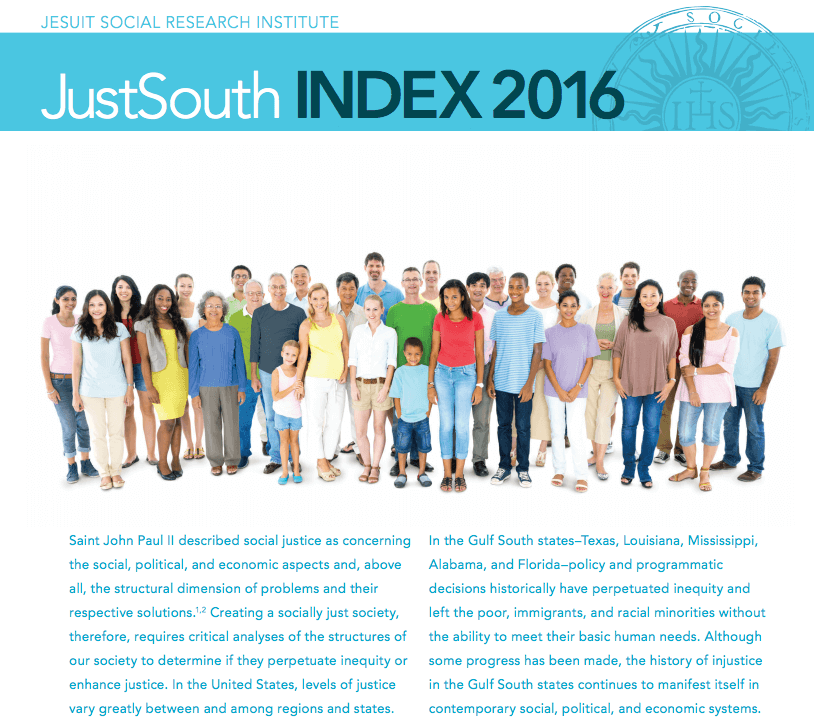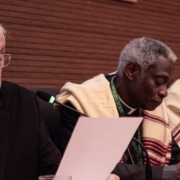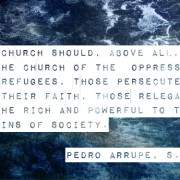Loyola University New Orleans Jesuit Social Research Institute Issues Inaugural JustSouth Index 2016
BY ISN STAFF | March 18, 2016
NEW ORLEANS, LA – A new report issued today by Loyola University New Orleans’ Jesuit Social Research Institute (JSRI) reveals that Louisiana ranks lowest in the U.S. on the JustSouth Index, an innovative new project that evaluates levels of social justice in the 50 states and Washington, D.C. The JustSouth Index measures and compares states’ performance on nine quantitative indicators that fall under the dimensions of poverty, racial disparity and immigrant exclusion ― three of the most challenging issues facing the Gulf South today.
According to the report, the other four Gulf South states also ranked especially low, with Mississippi at 50th position, Texas at 49th, Alabama at 48th and Florida slightly higher, in 41st position.
 JSRI officially released the inaugural JustSouth Index report and interactive website on Thursday, March 17, 2016, at Loyola.
JSRI officially released the inaugural JustSouth Index report and interactive website on Thursday, March 17, 2016, at Loyola.
The JustSouth Index, made possible by a grant from the W.K. Kellogg Foundation, sets out to establish a measure of social justice and to provide policymakers, employers and residents a better understanding of how residents of states in the Gulf South are faring with regard to the basic rights and needs of the human person.
“We have chosen indicators which are reported annually, measurable, clear, reliable, common across all jurisdictions, and actionable,” said Fr. Fred Kammer, S.J., J.D., executive director of the Jesuit Social Research Institute. “I emphasize ‘actionable’ because, in releasing this first JustSouth Index and in our planning for annual updates, our purposes are to educate the people of this region and to point out how we together can make the kind of changes that promote far greater social justice, equity, and inclusion for all of us who live here.”
The Just South Index 2016 examines nine social indicators that cut across the three key measures that address fundamental concerns of human development: health, education and income. The holistic report is not simply an economic report―it also provides a roadmap for changing the social environment.
Key findings in Louisiana include:
- On nine quantitative indicators related to social justice, Louisiana ranked 51st compared to all other states and Washington D.C. The other Gulf South states ranked similarly low, with Mississippi at 50th, Texas at 49th, Alabama at 48th, and Florida at 41st.
- The average income of households in the lowest income quartile in Louisiana was just $11,156 per year in 2014. This is compared to the national average of $15,281 per year and $20,956 per year in New Hampshire, the state that ranked highest on that indicator.
- Nine in ten Louisiana households that are in the lowest income quartile are renting their home are “housing cost burdened,” meaning that they spend 30 percent or more of their income on rent.
- Louisiana has the highest gap in annual earnings between white and minority workers of similar age, level of education, and occupation. Minority workers in Louisiana earn 21 percent less than their white counterparts when age, education, and job type are accounted for. This compares to a national average of an 8.8 percent gap.
- More than one-fifth, or 21.5 percent, of immigrant youth ages 18 to 25 in Louisiana are considered “disconnected youth.” This means that they reported not being enrolled in school or regularly employed.
- States that have raised the minimum wage, implemented a state Earned Income Tax Credit (EITC), expanded Medicaid eligibility, and invested in housing assistance outperformed states that have not. Louisiana has instituted a very modest state EITC and taken the initial steps to expand Medicaid eligibility. It is imperative that the state lawmakers continue and enhance efforts to address economic and social injustices.
Recommendations for improving social justice and equity in Louisiana include:
- raising the minimum wage;
- strengthening investments in child care assistance and creating a state Earned Income Tax Credit;
- creating state and local incentives for the development of affordable housing and investing state funds in low-income housing assistance;
- improving access to English as a Second Language (ESL) and adult education classes;
- revisiting policies that improved integration of schools in the 1970s and 1980s;
- increasing resources to schools that serve primarily minority and immigrant students, and
- combating employment discrimination and workers’ rights violations through enhanced enforcement efforts by federal, state, and nonprofit entities.
Jeanie Donovan, JSRI economic policy specialist and principal investigator on the social indicators project, led a team of research fellows and student researchers in researching and compiling the JustSouth Index. In the report, she states that state and local governments, as well as nonprofits and employers, have the ability to improve social justice for individuals and families in Louisiana.
“Although this inaugural release of the JustSouth Index paints a grim picture of the current state of social justice in Louisiana and the Gulf South, we are not without hope. Each individual indicator is connected to concrete policy and program recommendations,” Donovan said. “While the Gulf South states currently rank low in the Index, it is well within the power―and the duty―of leaders and citizens in those states to change the current reality for the common good of all of us.”











Leave a Reply
Want to join the discussion?Feel free to contribute!